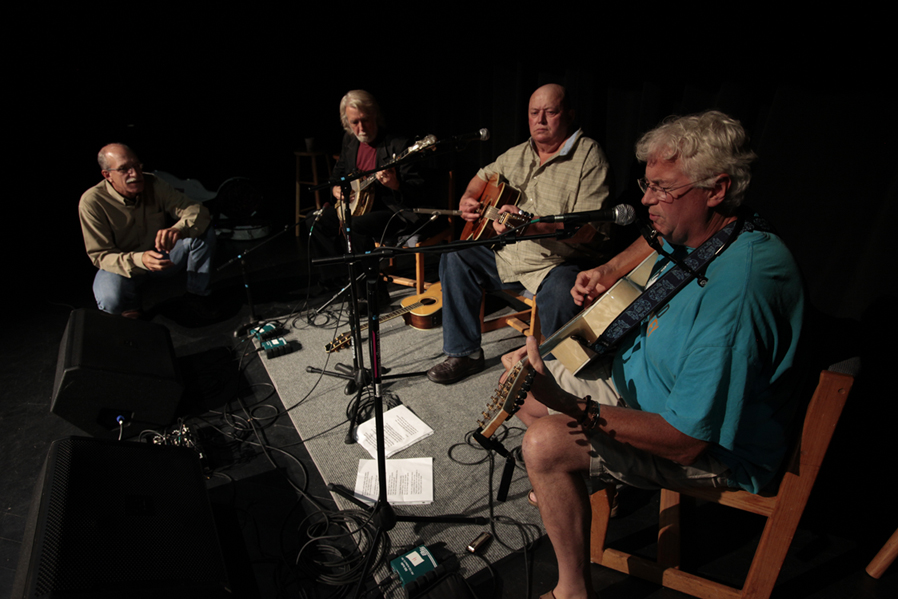#72) IT TAKES A CHORUS: The Need for “Cultural Liasons” for Effective Communication
September 27th, 2010
Ed Leydecker (far left) looks on as country music legend John McEuen (on banjo) and lobster fishermen Stevie Robbins (shaved head) and his brother Brian rehearse for the big show at Univ. of Maine last Wednesday night. Back in 1991 we gave Ed the credit of “Cultural Liaison” for the film “Salt of the Earth.” The entire project never would have happened if not for his people skills. Stevie had no interest in making a film with a marine biology professor from the University of New Hampshire (me), but after Eddie showed up at the dock in Portsmouth, N.H. at 3 a.m. with a box of donuts and hot coffee things began to change. As the crew tied up his boat, Stevie was unable to say no to Eddie’s offering. Two hours of friendly discussion later, Stevie reversed things and agreed to the filming session. Every film needs a cultural liaison like Ed.
HOW TO COMMUNICATE EFFECTIVELY
Last week, a journalist asked me what I consider to be most important for effective communication. Here’s what I wrote for him:
Voice, voice, voice. Communication is about “voices.” People listen to voices they like. They don’t listen to voices they don’t like. The bosses at BP figured this out the hard way last spring. Shortly after the Gulf spill they began running television commercials featuring BP CEO Tony Hayward and his British accent. Guess what? Within a month they wised up, dumped those spots, and came out with a whole series of commercials featuring working class Gulf of Mexico residents with their deep southern drawls. It’s about voice.
That’s the truth. How does it work? Try reading “Blink!” by Malcolm Gladwell for a start. It takes so little for people to open or close their channels of communication. In the same way that Gladwell talks about how an art forgery detective can tell you in an instant if a piece of artwork is a forgery but might need a couple days to figure out exactly why, it’s the same thing with voices. Most people would have a hard time pinpointing what it is about a certain voice they like, they just know they like it. Similar to music. Sometimes you just know what you like.
I heard this same thing last week at our screening of “Salt of the Earth” at University of Maine. Several people came up to me after the film and said, “I just love listening to those guys’ voices,” in reference to the lobster fishermen and their thick downeast accent.
“IT TAKES A CHORUS”
I invited the musician John McEuen to join us on the post-screening panel for “Sizzle” at University of Maine, thinking he might discuss the score he provided for the movie. His music is, of course, wonderful, but he contributed something even more interesting. He talked about all the fishermen he’d met in his performances in Nova Scotia and other coastal areas. Their stories affirmed to him what the movie says — that climate change is real and is happening. Which is why he recommended that someone try to communicate “the message” of climate change through the voices of people like these fishermen. It’s about diversifying the voices beyond the standard scientists and environmentalists.
The bottom line is that these days we can modify the “It takes a village” slogan — for effective communication to take place, “It takes a chorus.”
